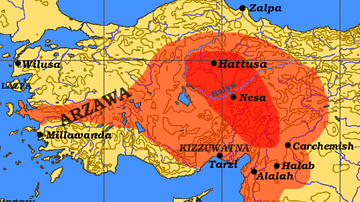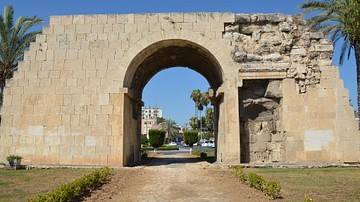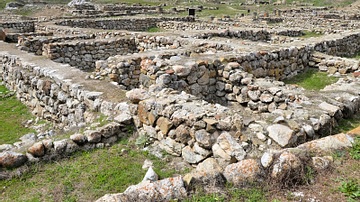Search
Did you mean: Hatti?
Search Results

Image
Map of the Hittite Empire, 13th century BCE
This map illustrates the rise and expansion of the Hittite Empire, an influential Anatolian power that flourished between circa 1750 and 1200 BCE. At its height in the mid-14th century BCE, the Hittites ruled much of Asia Minor, extending...

Definition
Bronze Age Collapse
The Bronze Age Collapse (also known as Late Bronze Age Collapse) is a modern-day term referring to the decline and fall of major Mediterranean civilizations during the 13th-12th centuries BCE. The precise cause of the Bronze Age Collapse...

Definition
Nineveh
Nineveh (modern-day Mosul, Iraq) was one of the oldest and greatest cities in antiquity. It was originally known as Ninua, a trade center, and would become one of the largest and most affluent cities in antiquity. It was regarded highly by...

Definition
Troy
Troy is the name of the Bronze Age city attacked in the Trojan War, a popular story in the mythology of ancient Greece, and the name given to the archaeological site in the north-west of Asia Minor (now Turkey) which has revealed a large...

Definition
Mitanni
The Kingdom of Mitanni, known to the people of the land, and the Assyrians, as Hanigalbat and to the Egyptians as Naharin and Metani, once stretched from present-day northern Iraq, down through Syria and into Turkey and was among the greatest...

Definition
Kaskians
The Kaska or Kaskians were a tribe of the Pontus, northern Anatolia (today's Turkey), around the Kizil Irmak river mouth, bordering on and constantly harrasing the Hittite empire. That area is mostly mountainous in nature, and there the Kaska...

Definition
Cilicia Campestris
Cilicia Campestris was one of the six districts of the Roman province of Cilicia organized by Pompey the Great (l. c. 106-48 BCE) in 64 BCE. The name translates roughly into “Cilicia of the Plains” and corresponds to the earlier name for...

Image
Hittite Version of Kadesh Treaty
This is the Hittite version of the so-called "Kadesh Treaty" (also called the Silver Treaty or the Eternal Treaty). It was an Egyptian-Hittite peace treaty. Only three tablets of this Treaty were found in the Hittite capital, Hattusa, among...

Image
Overview of Alacahöyük Hittite Settlement
Overview of the ruins at Alacahöyük, the site of a Neolithic and Hittite settlement in central Turkey. Alacahöyük was the centre of the flourishing Hattian culture during the Bronze Age. It was later occupied by the Hittites who used the...

Article
The Battle of Kadesh & the Poem of Pentaur
The Poem of Pentaur is the official Egyptian record (along with The Bulletin) of the military victory of Ramesses II (known as The Great, 1279-1213 BCE) over the Hittite King Muwatalli II (1295-1272 BCE) at the Battle of Kadesh in 1274 BCE...